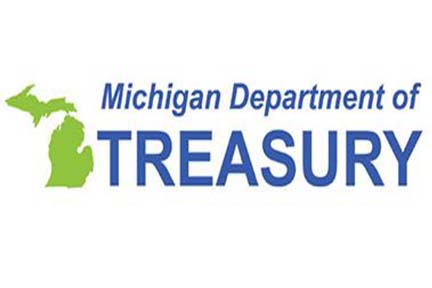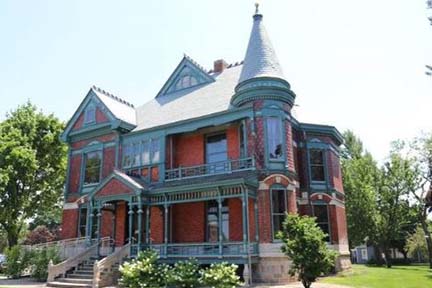
Governor Whitmer Makes Appointments to Boards and Commissions
LANSING, Mich. — Today, Governor Gretchen Whitmer announced appointments to the following boards and commissions: Michigan Tax Tribunal; Michigan Historical Commission; Manufactured Housing Commission; Residential Builders’ and Maintenance and Alteration Contractors’ Board; Michigan Board of Real Estate Appraisers; Governor’s Educator Advisory Council; Board of Law Examiners; Governor’s Traffic Safety Advisory Commission; Organized Retail Crime Advisory Board; and the Michigan Natural Resources Commission.
Jason Grinnell, of Grand Rapids, has been a judge on the Michigan Tax Tribunal since 2021. Grinnell holds a Bachelor of Arts in criminal justice with a minor in business from Saint Mary’s University of Minnesota and a Juris Doctor from Thomas Cooley Law School. Jason Grinnell will be reappointed as an attorney for a term commencing July 1, 2025, and expiring June 30, 2029.
The Michigan Tax Tribunal is an administrative court that hears tax appeals for all Michigan taxes. Most of the Tribunal’s appeals involve property tax; however, the Tribunal also hears business and individual tax disputes.
This appointment is subject to the advice and consent of the Senate.
Michigan Historical Commission
Eric Hemenway, of Harbor Springs, is the director of archives and records for the Little Traverse Bay Bands of Odawa Indians. Eric Hemenway will be reappointed for a term commencing May 22, 2025, and expiring May 21, 2029.
Laura Ashlee, of Okemos, is retired from the Michigan State Historic Preservation Office, where she served as a certified local government coordinator, historian, and communications liaison. Ashlee additionally served as manager of the Michigan Historical Marker program for 21 years of her 30-year career. Ashlee holds a Bachelor of Arts in humanities and a Master of Arts in American studies from Michigan State University. Laura Ashlee will be reappointed for a term commencing May 22, 2025, and expiring May 21, 2029.
The Michigan Historical Commission was established in 1913 and advises the director of the Michigan Department of Natural Resources on the museum, archival and other programs of the Michigan Historical Center. It approves Michigan Historical Markers and each year; the Michigan Historical Commission presents the Governor John B. Swainson Award to state and local government employees who do not work in the field of history but have made exceptional contributions to preserving and interpreting the stories of Michigan’s past.
These appointments are subject to the advice and consent of the Senate.
Manufactured Housing Commission
Victoria Policicchio, of Birmingham, is the associate counsel at Champion Home Builders, Inc. Policicchio holds a Bachelor of Arts in English and Italian from the University of Michigan and a Juris Doctor from Michigan State University College of Law. Policicchio will be appointed as a representative of manufacturers of mobile homes for a term commencing May 10, 2025, and expiring May 9, 2028. Policicchio succeeds Daniel Grant, whose term has expired.
The Manufactured Housing Commission is responsible for establishing uniform policy relating to all phases of manufactured housing, business, manufactured housing parks, and seasonal manufactured housing parks. The Commission has the legal authority to approve local governmental ordinances which would regulate manufactured housing, grant variances to the Manufactured Housing Commission Rules, approve licenses for manufactured home installer/servicers and retailers, and impose penalties on persons who have violated the Mobile Home Commission Act or Rules.
This appointment is subject to the advice and consent of the Senate.
Residential Builders’ and Maintenance and Alteration Contractors’ Board
Kenneth Stahl, of Brighton, is a construction superintendent at AUCH. Stahl previously served as a construction manager at Corby Energy, an assistant superintendent at Charyl Stockwell Academy, and a project coordinator at DTE Energy. Stahl is also a licensed residential builder and attended Macomb Community College for law enforcement and business management. Kenneth Stahl is reappointed to represent licensed residential builders for a term commencing May 8, 2025, and expiring March 31, 2029.
Donald Wood, of Ypsilanti, is the regional director of construction and qualifying officer for Certified Flooring Installation, Inc. Wood holds a Bachelor of Arts in fine arts from Eastern Michigan University. Donald Wood is reappointed to represent licensed builders for a term commencing May 8, 2025, and expiring March 31, 2029.
The Michigan Residential Builders’ and Maintenance and Alteration Contractors’ Board was created to license and regulate persons engaged in the construction of a residential structure or combination residential and commercial structure, or persons who undertake the repair, alteration, addition, subtraction, or improvement of a residential structure or combination residential and commercial structure for compensation other than wages for personal labor.
These appointments are subject to the advice and consent of the Senate.
Michigan Board of Real Estate Appraisers
Jake Lew, of Birmingham, is the founder and chief executive officer of Aivre and a certified residential real estate appraiser. Jake Lew will be reappointed as a certified residential real estate appraiser for a term commencing July 1, 2025, and expiring June 30, 2029.
Catherine Quayle, of Gwinn, is a certified residential real estate appraiser at Appraisal Associates of Marquette. Quayle holds an associate’s degree in business from Northern Michigan University. Catherine Quayle will be reappointed to represent certified residential real estate appraisers for a term commencing July 1, 2025, and expiring June 30, 2029.
The Michigan Board of Real Estate Appraisers works with the Department of Licensing and Regulatory Affairs to oversee the practice of approximately 6,011 limited real estate appraisers, state licensed appraisers, certified general appraisers, and certified residential appraisers.
These appointments are subject to the advice and consent of the Senate.
Governor’s Educator Advisory Council
Joseph Sbar, of Sault Ste. Marie, is a school psychologist for the Eastern Upper Peninsula Intermediate School District in Sault Saint Marie. Sbar is also an adjunct professor of ballroom dance at Lake Superior State University, an adult career and technical education job coach, and radio DJ at Eagle Radio 95.1 FM. Sbar holds a Bachelor of Science in psychology and a master’s degree in psychology from Michigan State University. Sbar currently serves as an advisory board member for Project Hi2LD, as lead organizer for the Eastern Upper Peninsula PREPaRE Crisis Response Team, as a member of the Eastern UP Intermediate Education Association Bargaining Team, and as a member of the Chippewa/Mackinac/Luce County Youth Mental Health Committee. In 2021, Sbar received the Michigan School Psychologist of the Year Award from the Association of School Psychologists. Joseph Sbar will be reappointed to represent counselors for a term commencing May 10, 2025, and expiring May 9, 2029.
Benedict Pineda, of Lansing, is a middle school social studies, life skills, and drama and speech teacher at Haslett Public Schools. Pineda also previously served as an adult education teacher for Holt Public Schools. Pineda holds a Bachelor of Arts in social science teaching and English from Michigan State University. Benedict Pineda will be reappointed to represent teachers for a term commencing May 10, 2025, and expiring May 9, 2029.
Glenn Martin, Sr., of Farmington, is the director of the Upward Bound program at Mott Community College. Martin holds a Bachelor of Arts in English, a Master of Arts in education specializing in curriculum and instruction from the University of Washington, and an education specialist degree from Central Michigan University. Glenn Martin, Sr. will be reappointed to represent specialists for a term commencing May 10, 2025, and expiring May 9, 2029.
The Governor’s Educator Advisory Council was created by Governor Whitmer’s Executive Order No. 2019-09. The Council will review and make recommendations regarding legislation relevant to this state’s public education system, identify and analyze issues impacting the effectiveness of Michigan’s public education system, identify best practices in public education and recommend corresponding changes and improvements to Michigan’s public education system, and provide other information or advice relevant to public education.
These appointments are not subject to advice and consent of the Senate.
Andrea LeGendre, of Grand Blanc, is the managing assistant prosecuting attorney for Genesee County. LeGendre serves on the boards of the East Central Bay Chapter of the American Red Cross and the Women and Girls Fund Advisory Committee of the Community Foundation of Greater Flint. LeGendre holds a Bachelor of Arts in political science and history from the University of Michigan – Flint and a Juris Doctor from Cooley Law School. Andrea LeGendre will be appointed as the nominee of the Michigan Supreme Court for a term commencing July 1, 2025, and expiring June 30, 2030. LeGendre succeeds Jeffrey Stuckey, whose term is expiring.
The Board of Law Examiners is responsible for investigating and examining all persons who initially apply for admission to the Michigan Bar. The Board may adopt suitable regulations, subject to approval by the Supreme Court, concerning the performance of its functions and duties.
This appointment is not subject to the advice and consent of the Senate.
Governor’s Traffic Safety Advisory Commission
Sheriff Michael Poulin, of North Muskegon, currently serves as the Muskegon County Sheriff. Poulin also serves as president of the Michigan Sheriffs’ Association and is a recipient of the Richard H. Austin Traffic Safety Award and the M.A.C.P. Award for Excellence in Traffic Safety. Sheriff Michael Poulin will be reappointed as a representative of local units of government for a term commencing May 28, 2025, and expiring May 27, 2028.
The Governor’s Traffic Safety Advisory Commission shall identify traffic safety challenges and develop, promote, and implement strategies to address those challenges. The Commission shall develop comprehensive solutions to traffic safety challenges through partnerships with all levels of government and the private sector, while maximizing and coordinating the use of existing financial resources.
This appointment is subject to the advice and consent of the Senate.
Organized Retail Crime Advisory Board
Chad Baugh, of Canton, is the police chief and director of police services for the Canton Police Department. Baugh holds a certification from the Michigan Commission on Law Enforcement Standards, a Bachelor of Science in criminal justice from Madonna University, and a Master of Science in technology from Eastern Michigan University, where he also graduated from the University’s School of Police Staff and Command. Chad Baugh is appointed as a member representing a city, village, or township police department or a county sheriff’s department for a term commencing May 8, 2025, and expiring March 30, 2029. Baugh succeeds Vernon Coakley, whose term has expired.
The Organized Retail Crime Advisory Board was created to develop a database of organized retail crimes, compile annual statistics on organized retail crime acts, recommend actions to be taken by the department and law enforcement to further combat organized retail crime, and to submit an annual report to the director of the department on the effectiveness of this act in reducing organized retail crime.
This appointment is subject to the advice and consent of the Senate.
Michigan Natural Resources Commission
Rebecca Humphries, of Lowell, recently retired as chief executive officer of the Theodore Roosevelt Conservation Partnership. Before that, Humphries served as the chief executive officer of the National Wild Turkey Federation. Humphries began her career with the U.S. Fish and Wildlife Service before joining the Michigan Department of Natural Resources (DNR). While at DNR, Humphries held several high-level roles, including chief of the Wildlife Division, and became the first woman to be appointed as director. Humphries also currently serves on the boards of the Congressional Sportsmen’s Foundation and the Theodore Roosevelt Conservation Partnership. She previously held leadership roles with the Association of Fish and Wildlife Agencies, where she led the National Fish and Wildlife Health Initiative. Humphries holds a Bachelor of Science in wildlife biology from Michigan State University. Rebecca Humphries is designated to serve as chair for a term commencing May 8, 2025, and expiring at the pleasure of the Governor. Humphries succeeds Dan Kildee as chair, who has resigned.
The Michigan Natural Resources Commission (NRC) has exclusive authority to regulate the taking of game and sportfish. It is additionally authorized to designate game species and to establish the first open season for animals through the issuance of orders.
This appointment is not subject to the advice and consent of the Senate.
|

















